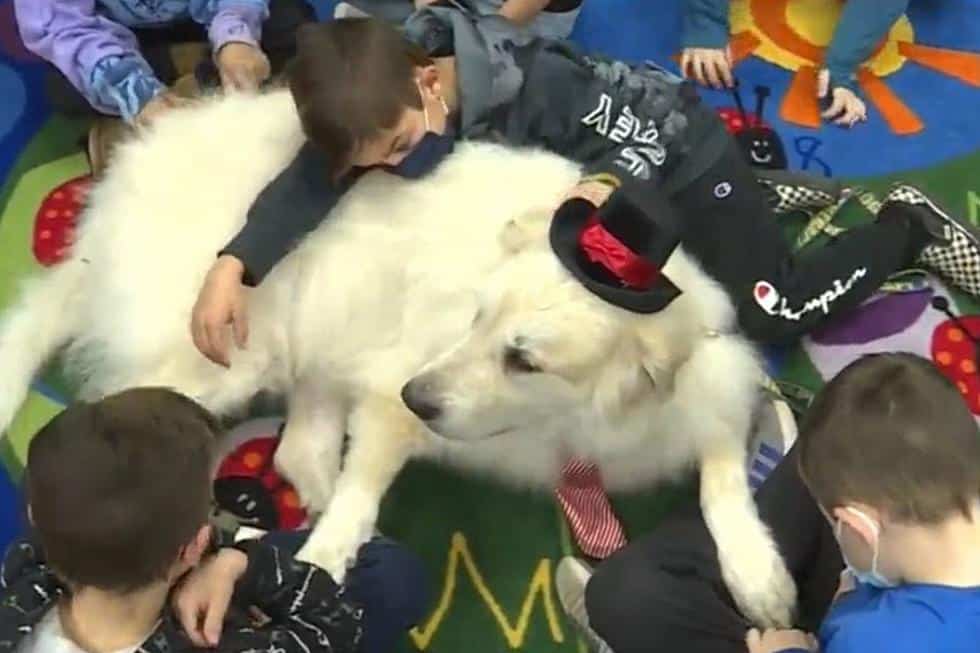Table of Contents
So you’re considering adding a Great Pyrenees to your family. Their gorgeous white coats and loyal nature make them seem like the perfect family dog. But with kids in the mix, you likely have some questions. Are these “gentle giants” really a good fit for a household with little ones?
Let’s take a deep dive into the Great Pyrenees personality and explore how they tend to interact with children.
How Can I Ensure My Great Pyrenees Is Safe and Friendly Around Kids?
When teaching English to children, it’s important to ensure that your Great Pyrenees is safe and friendly around them. Start by socializing your dog with kids at a young age, and always supervise their interactions. Teach children how to properly approach and interact with your dog to promote a positive relationship.
The Calm, Loyal Temperament of Great Pyrenees
Great Pyrenees were originally bred as livestock guardian dogs, working independently to protect flocks from predators. This history helps explain a lot about their temperament. They’re intelligent but also strong-willed – after all, they had to make decisions on their own out there in the fields!
These pups are known for being incredibly loyal and calm, especially with their own humans. In fact, Great Pyrenees often become very attached to their families, including the kids. Many owners describe them as gentle, serious, and patient.
While loyal and affectionate with their “pack,” Great Pyrenees tend to be aloof around strangers. Those protective instincts are strong! Early socialization is a must for these pups.
So when it comes to children who they consider part of their family, Great Pyrenees are usually quite nurturing. Those protective tendencies shine through. But how do they interact with toddlers and babies?
Bringing Home Great Pyrenees Puppies with Babies
Great Pyrenees generally treat babies and toddlers very gently. In fact, their sweet nature means they will be very careful and patient around little ones.
However, their large size does mean you have to take some precautions. Accidental collisions could knock over a small child, even though the Great Pyrenees had good intentions. For this reason, experts recommend always supervising interactions between Great Pyrenees and babies.
It’s also important to socialize Great Pyrenees well to accept children as part of their pack. Some Great Pyrenees can become jealous when attention gets diverted from them to a new baby. With the proper training and boundaries, they will learn to accept your bundle of joy.
Obedience Training is Essential
All dogs require training, but it’s especially crucial for giant, protective breeds like Great Pyrenees. Their tendency to be strong-willed means training requires plenty of patience and consistency.
Focus on positive reinforcement like treats and praise over punishment. Socialization should begin early and include exposure to people of all ages, including babies and children. Basic obedience cues like “leave it” and “settle” also go a long way when teaching good behavior around kids.
Leash training is another must. Great Pyrenees love to wander and roam, so practice having them stay close to you. This ensures they don’t accidentally knock over your toddler while out on a walk.
The Playful Side of Great Pyrenees Puppies
Great Pyrenees puppies require plenty of play time and exercise. This helps prevent problem behaviors like chewing, digging, and barking later on.
As work dogs, Great Pyrenees have a moderate energy level. They need 30-60 minutes of exercise per day. This gives them an outlet for their natural guardian instincts.
Great Pyrenees love outdoor play like hiking, swimming, or playing fetch. This burns their mental and physical energy. Just be careful not to over-exercise them as puppies, as their joints are still developing.
To raise a well-socialized Great Pyrenees puppy, incorporate children into playtime. Teach your kids how to gently play with the pup, and always supervise interactions. Proper play teaches dogs how to be gentle with kids.
Prevention and Solutions for Common Problems
While Great Pyrenees make wonderful family companions, they do come with some challenges. Let’s look at some common issues and solutions:
Accidental Collisions – Their large size means Great Pyrenees can bump into toddlers and knock them over, even during play. Careful supervision and training are key. Teach them cues like “gentle” and “back up.”
Herding Behavior – Some Great Pyrenees try to herd or corral children by nudging or jumping up. Redirect this instinct into positive activities like agility.
Separation Anxiety – These loyal pups hate being left alone. Crate training and providing interactive toys helps ease separation stress.
Excessive Barking – Bred to warn of predators, barking comes naturally. Reduce boredom with more exercise. Anti-bark collars can also help.
Territorial Aggression – Socialization and basic obedience training goes a long way in managing their protective instincts.
The good news? With time and training, most Great Pyrenees adjust well to households with children. Proper management when they’re young sets up good habits for the long run.
The Great Pyrenees Devotion to Family
The loyalty Great Pyrenees feel toward family, especially kids, simply can’t be overstated. These gentle giants will often put themselves between their family and any perceived threat.
Many Great Pyrenees form an especially close, protective bond with the children in their household. They become devoted, lifelong companions. In fact, Great Pyrenees who have lost their families often have trouble adjusting to new owners.
This loyalty also makes them eager to please their people from a young age. When raised with love and patience, Great Pyrenees shower affection on both adults and children in their family.
Is the Great Pyrenees a Good First Dog?
The Great Pyrenees is better suited to experienced dog owners. Their strong personality means they need extensive training and proper handling from the start.
This breed also requires a decent amount of grooming and moderate daily exercise. The Great Pyrenees thick double coat sheds heavily year-round. They need weekly brushing to control loose fur.
First-time owners may find it difficult to control a rapidly growing Great Pyrenees puppy. Their size and strength require an experienced hand. If not properly trained, these intelligent pups will take advantage of new owners.
While dedicated owners will enjoy their lifelong devotion, Great Pyrenees do best in homes with plenty of time to dedicate to exercise, training, and companionship. Otherwise, their boredom may lead to nuisance barking or destruction.
Should You Add This Gentle Giant to Your Crew?
Great Pyrenees can make wonderful family companions, especially when raised with children. Early socialization and training helps them become patient, gentle guardians.
However, their large size and protective instincts require caution and supervision around little ones. With maturity and boundaries, Great Pyrenees learn to handle kids with care.
Assess your family’s lifestyle and experience level before deciding if this breed is right for you. When given the proper environment and leadership, the naturally calm Great Pyrenees usually thrives in homes with children.

